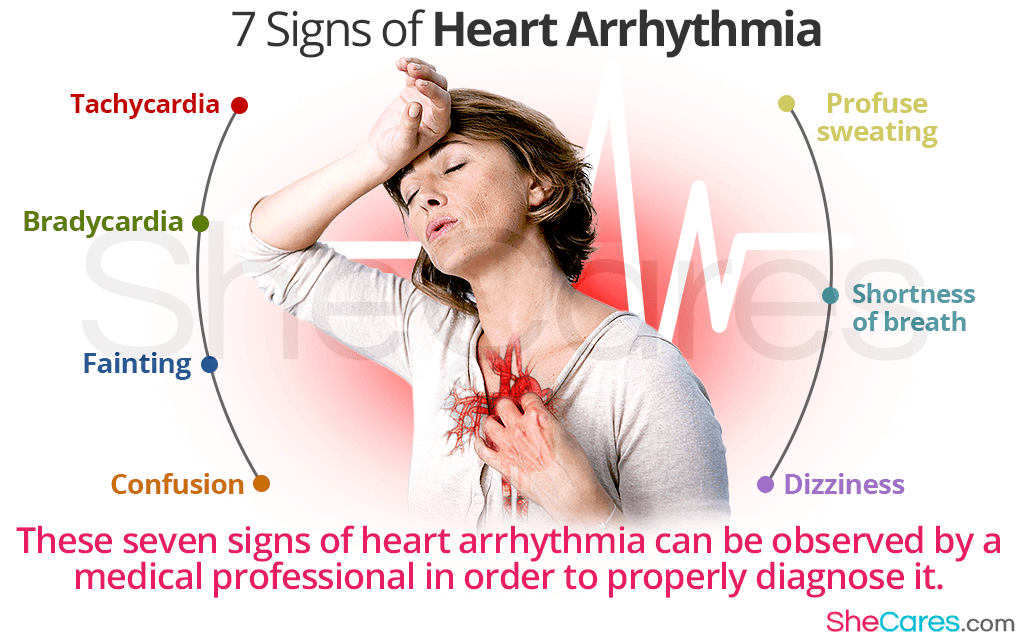While some heart arrhythmias bring about clear symptoms, such as palpitations or chest discomfort, other types do not give away any obvious indications that the heart is beating too rapidly, too slowly, or irregularly. As such, many women may not be aware of any irregularities until the next doctor's visit, making learning how to promptly recognize signs of irregular heartbeat that much more important.
Read on to learn more about the main signs of heart arrhythmia as well as its causes, types, and ways to diagnose it for an optimally strong and healthy heart.
7 Signs of Heart Arrhythmia
While the following signs of heart arrhythmia are technically considered symptoms, for the purpose of this article, we will use them interchangeably as commonly seen in other resources.
The most important seven signs of heart arrhythmia - which can be reported by the sufferer, observed by a doctor, and measured with medical tests for proper diagnosis - include the following:
- Rapid heartbeat (tachycardia)
- Slow heartbeat (bradycardia)
- Shortness of breath
- Profuse sweating
- Confusion
- Dizziness
- Fainting
Heart Arrhythmia Causes
Heart arrhythmia has a wide range of possible causes, including, but not limited to, the following:
Hormonal fluctuations characteristic of menstruation, pregnancy, or menopause
Medical conditions, like diabetes, heart disease, or thyroid disorder
Common triggers, like caffeine, stress, medications, cold remedies, or air pollution
Heart Arrhythmia Types
While arrhythmias can be categorized in many ways, the most classic categorization is based on the origin of irregular heart impulse and whether the arrhythmia causes a fast or a slow heart rate.
Arrhythmia types based on the origin:
Supraventricular (originating in the atria): Supraventricular arrhythmias are usually non-life-threatening.1
Ventricular (originating in the ventricles): Ventricular arrhythmias are potentially life-threatening.1
Arrhythmia types based on the heart rate:
Tachycardia is a medical term for a fast heartbeat, defined as exceeding 100 beats per minute.2
Bradycardia is a medical term for a slow heartbeat, defined as less than 60 beats per minute.2
To explain this division with an example, a supraventricular tachycardia is a fast heartbeat that originates in the atria.
Heart Arrhythmia Diagnosis
Diagnosing heart arrhythmia might be challenging because the episodes of irregular heartbeat oftentimes come and go and do not last long enough to be observed during a doctor's visit.
Nevertheless, besides a thorough physical examination and collection of medical history, a cardiologist will use a number of tests to confirm the diagnosis. They may include an electrocardiogram, echocardiogram, stress test, or cardiac catheterization.
Conclusions
Although undoubtedly a reason for concern, heart arrhythmia can be effectively treated, which - depending on the underlying cause - may range from wholesome lifestyle changes and natural medicine to pharmacological options and - sometimes - surgical interventions. However, women with irregular heartbeat who are passing through times of hormonal signification, like menopause, can take consider giving alternative therapies for balancing hormones naturally a try as to take good care of their heart.
Sources
- American Heart Association. (2019). Symptoms, Diagnosis, and Monitoring of Arrhythmia. Retrieved October 28, 2019 from http://www.heart.org/HEARTORG/Conditions/Arrhythmia/SymptomsDiagnosisMonitoringofArrhythmia/Symptoms-Diagnosis-Monitoring-of-Arrhythmia_UCM_002025_Article.jsp
- American Heart Association. (2016). Common Tests for Arrhythmia. Retrieved October 28, 2019 from http://www.heart.org/HEARTORG/Conditions/Arrhythmia/SymptomsDiagnosisMonitoringofArrhythmia/Common-Tests-for-Arrhythmia_UCM_301988_Article.jsp
- Mayo Clinic. (2019). Heart arrhythmia. Retrieved August 11, 2017 from http://www.mayoclinic.org/diseases-conditions/heart-arrhythmia/symptoms-causes/dxc-20188128
- National Heart, Lung, and Blood Institute. (n.d.). Arrhythmia. Retrieved October 28, 2019 from https://www.nhlbi.nih.gov/health/health-topics/topics/arr/types
Footnotes:
- Arrhythmia Alliance. (n.d.). Types of arrhythmia. Retrieved October 28, 2019 from https://www.heartrhythmalliance.org/aa/uk/types-of-arrhythmia
- Cleveland Clinic. (2019). Arrhythmia. Retrieved October 28, 2019 from https://my.clevelandclinic.org/health/diseases/16749-arrhythmia
